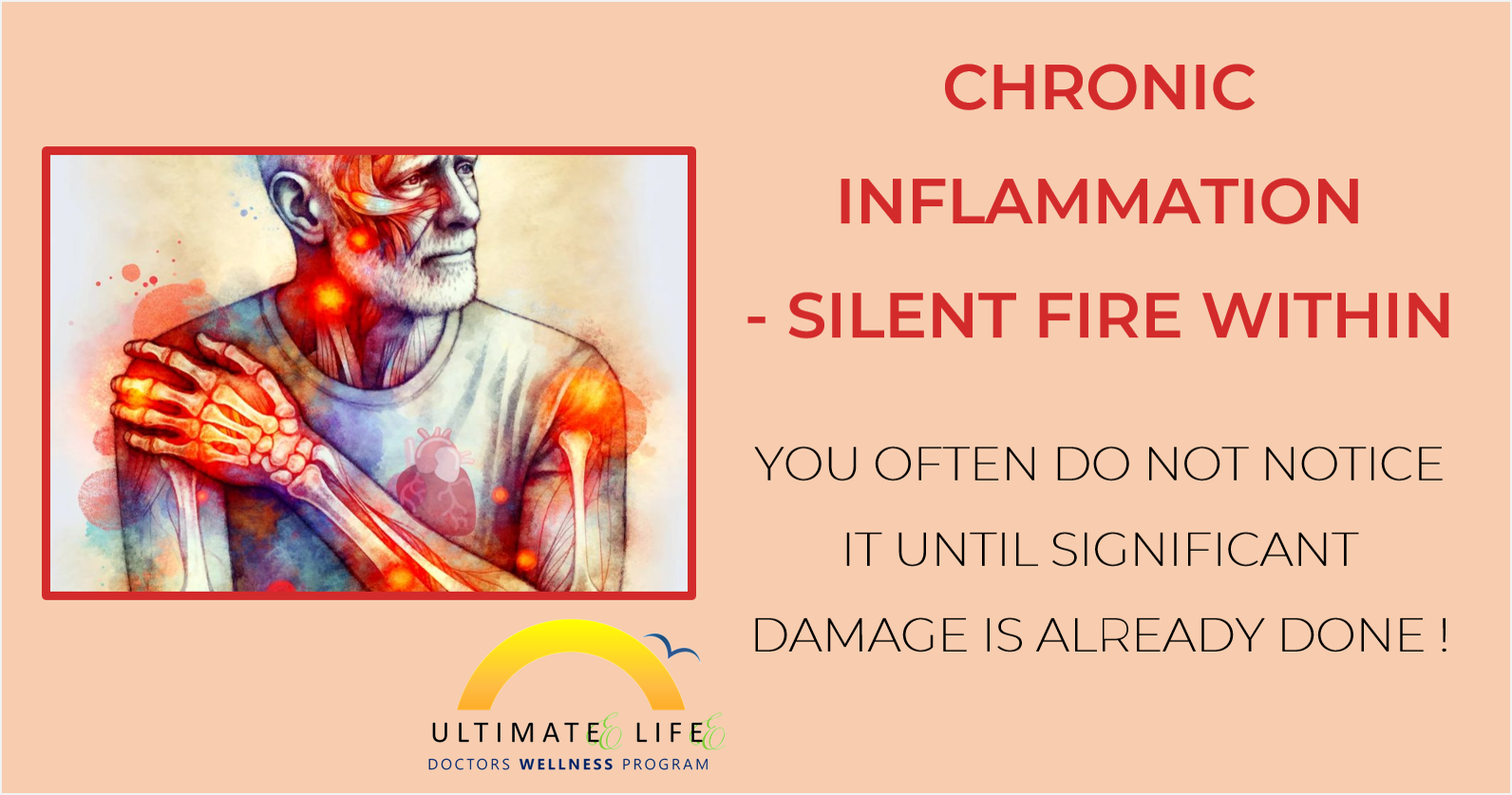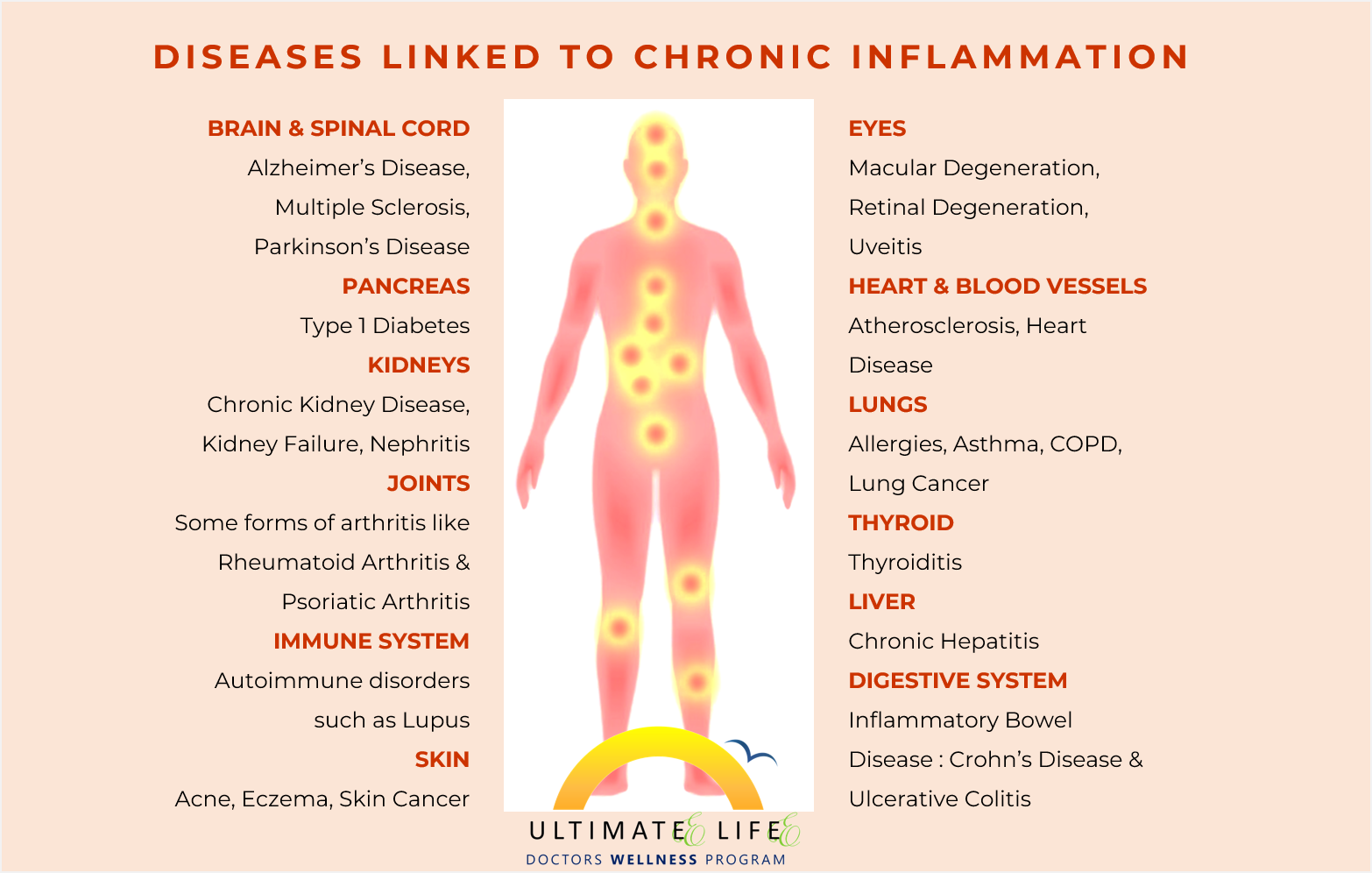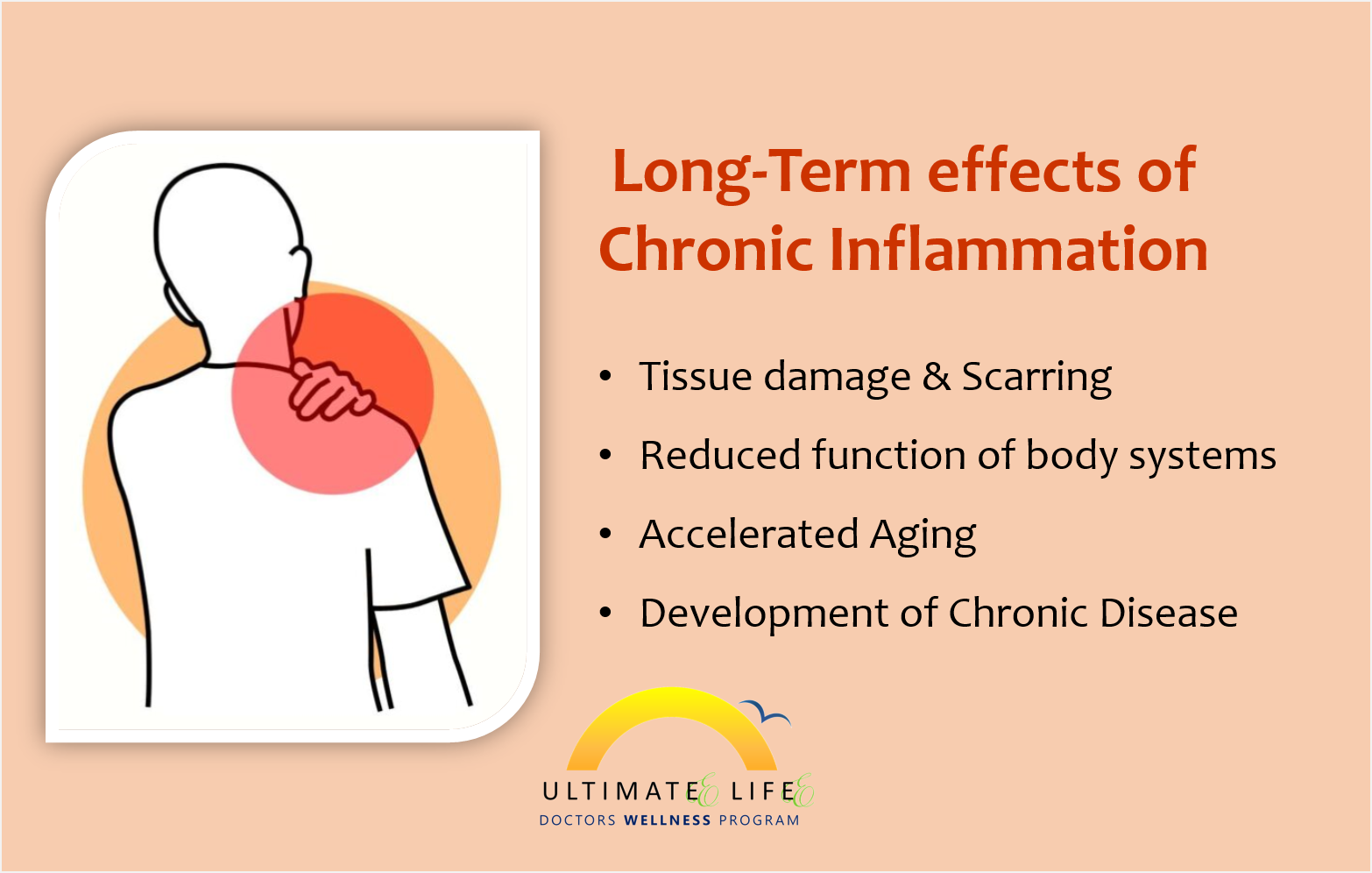Chronic Inflammation

What is inflammation?
It is a part of the body's defence mechanism. It is the process by which the immune system recognizes and removes harmful and foreign stimuli and begins the healing process. Inflammation has been labelled as “the fire within, which is highly regulated,” and is critical to host defence and tissue repair.
We're familiar with the acute type - when we hurt our knee or cut our finger - the immune system sends an army of white blood cells and chemical messengers to surround and protect the area creating redness, warmth, swelling and pain around tissues or joints.
This process helps to restore the injured tissue functions. The same process works in infection.
So, Inflammation is essential as it plays the most important role in healing and injury repair to keep our body safe and healthy.

Chronic Inflammation -
When our immune system is continuously kept in trigger mode, it continues to pump white blood cells and chemical messengers indefinitely - its chronic inflammation. It’s like – if the body is under constant attack and the immune system keeps on fighting indefinitely.
When this happens, white blood cells may end up attacking nearby healthy tissues and organs - causing tissue destruction, tissue remodelling (e.g. fibrosis) that may eventually cause irreversible tissue dysfunction and loss of organ function.
Chronic inflammation is a cardinal sign of ongoing degenerative disorder in your body. It is alarming.
Chronic inflammation is associated with Allergies, Diabetes, Cancer, Arthritis, Heart Disease like Atherosclerosis (blockage), Myocardial infarction (Heart Attack), Bowel Diseases like Crohn's Disease and Ulcerative Colitis, Kidney disease - glomerulonephritis, end-stage renal disease, or chronic kidney disease (CKD). Neurodegenerative diseases like Alzheimer's and Parkinson's disease..
Signs of inflammation are like a car's warning lights on the dashboard. It tells you that something is wrong with some part. Rather than switching those lights off, You actually try to find what caused the light to turn on. Inflammation accompanies a number of chronic diseases. And for many conditions, controlling that inflammation is an important part of treatment. It’s also true that unchecked inflammation contributes to long-term health problems.
Chronic inflammation is trickier to deal with because chronic inflammation is often "invisible," it does not show physical signs the way acute inflammation does.
Inflammation in obesity, diabetes, or cardiovascular disease causes no specific symptoms.
Degenerative disorders like Diabetes, Atherosclerosis, Parkinson’s syndrome, Alzheimer disease, osteoarthritis and rheumatoid arthritis share a common pathological feature of inflammation. Obesity, Ageing and Metabolic Syndrome is also characterised by a low grade chronic inflammation.
Inflammation also precedes most cancers and is considered a hallmark of the neoplastic process.
Obesity has been considered a bad prognostic feature in people with inflammatory conditions. Hence there is a kind of shared pathology between cancers and metabolic syndrome and the common pathway is inflammation due to disturbance in micro channel circulation or rather of diffusion.

What to test to check Inflammation?
CRP - C Reactive Protein test measures the level of CRP in a sample of your blood. CRP is a protein that your liver makes. Your liver releases more CRP into your bloodstream if you have inflammation in your body. High levels of CRP may mean you have a serious health condition that causes inflammation.
hs-CRP : elevated level may be predictive of a myocardial infarction, stroke, peripheral vascular disease, and sudden cardiac death.
Inflammatory marker tests are all non-specific tests. This means they don’t identify what’s causing the inflammation: it might be as simple as a mild infection, or as serious as cancer.
Certain conditions might be irreversible if gripped by chronic inflammation e.g., pancreatitis in the pancreas, hepatitis in the liver or pericarditis, which is the inflammation of the heart muscles. These are just a few examples, though there are many more ways that inflammation can present itself in the body.
It is best to keep a lookout for signs of high inflammation such as general weakness, fatigue, recurring fever, aches and pain in joints, unexplained muscle soreness, persistent chest or abdominal pain, skin rashes, digestive problems, mood disorder.
So how can you prevent or reduce inflammation you cannot necessarily see or feel?
The best approach is to get yourself tested. If it is there, take necessary precautions in your eating and lifestyle choices. You can take certain herbs to control it. Take only those herbs which are suitable to your condition and to your body type. Never go by what others or the internet recommend.
AYURVEDIC APPROACH TO INFLAMMATION
Shotha, Shopha, Svayatu, Utsedha and Samhata are some terms used in context to Inflammation. Chronic inflammation is a cardinal sign of chronic degenerative disorders. Inflammation and oedema associated with it is duly recognised in Ayurveda as a pathological manifestation.
While modern medicine considers inflammation as a symptom or a healing response of the body, Ayurveda sees the inflammation as (a) symptom of a disease (b) an independent disease and (c) a complication of diseases.
The disturbances in micro channel circulation in inflammation are due to Sroto dushti (clogging of channels) by Aama (toxic waste of metabolism). Preventing Aama formation holds the key to preventing chronic degenerative disorders. The obstruction of micro channels by Aama (toxic waste of metabolism) is responsible for loss of homeostasis, inflammation and tissue damage. Blockage of Srotas or micro channels that nourish tissues is the root cause of metabolic and degenerative disease. Aama is believed to have antigenic and pro-inflammatory properties. Emphasis is laid on purificatory procedures or detoxification.
How we can help?
By making healthy changes now, you can make a difference to your health outcomes. To maintain health and fight diseases, the body needs the right nutrients, at the right time, and in the right ratio.
We help you to identify what changes or support you need for your overall wellness.
Our approach involves a thorough assessment of your health status, address risk factors, best dietary options for positive health outcomes and supportive herbs to manage and reverse the effects of inflammation on the body systems and to help recover faster.
We’re here to Help You Find Answers and Feel Better.
Contact us today to schedule a consultation and learn more about how we can help you.